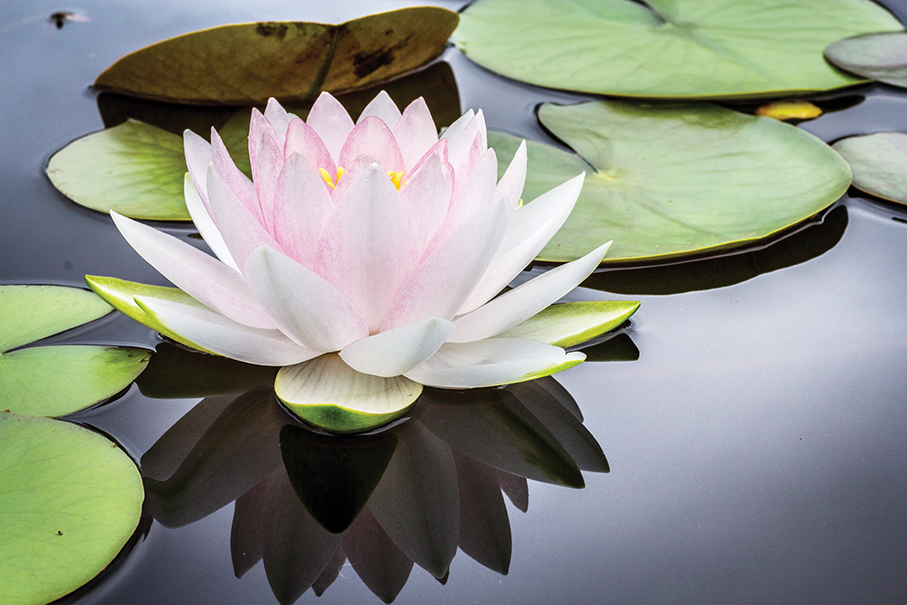“What are you writing about?” he asked.
“A Chinese flower.”
“A Chinese flower? Like a lotus?” he continued.
“Why didn’t you guess peony? It is our national flower.”
“It seems like you are the type of person that would appreciate lotus more,” he grinned.
Lotus, the regional flower of Macau as well as the main symbol of the city’s flag, represents purity and incorruptibility. The three lotus petals on the flag symbolise the three areas that make Macau as a whole – the peninsula, Taipa and Coloane. Chinese perennial love for the lotus can be seen in its culture, symbols and art. There is even a legend about how the lotus was created.
Once upon a time, the Queen Mother of the West’s (王母娘娘) maid, whose beauty is compared to a jade, envied the lives of humans and wanted to be like couples on Earth. With the encouragement of the river god’s daughter, she slipped out of the Sky Palace and descended to West Lake – the symbol of Hangzhou.
The maid indulged in the beautiful scenery of the lake and stayed there until dawn. However, when the Queen Mother of the West found out that her maid desired freedom, she punished her using the lotus throne and buried her underneath in the silt at the bottom of the lake. The maid detested the life underneath the mud, so she gathered spirits from all beings to bloom as a pure lotus. Later, people believed that this was the origin of the resilient nature and gentle appearance of the flower.
“What is he like?” she asked.
“Like a lotus flower.”
“What a peculiar way to describe someone,” she added.
“Indeed, lotus is a peculiar flower.”
There is a Chinese poem about the lotus flower which I memorised when I was in primary school and it has been imprinted in my brain ever since. 愛蓮說, which literally translates as “On the Love of Lotus”, describes what the author, Zhou Lianxi, sees in the flower and personifies a gentleman.
According to the poem, Zhou likes the lotus because “stainless it rises from mud, modestly reposes on the clear pool” (出淤泥而不染,濯清漣而不妖). The flower is being analogised to a gentleman who remains virtuous despite the corrupted surroundings and remains steadfast in the face of temptation.
Moreover, an implication of a gentleman’s characteristics is seen in the description of the lotus’ appearance when Zhou illustrates the flower as “an emblem of purity and truth, symmetrically perfect, its subtle perfume is wafted far and wide” (中通外直,不蔓不枝,香遠益清). The author uses the scent of the flower to allude to the simplicity and humble qualities of a good man.
In the second part of the poem, Zhou uses different floral symbolisms– “the chrysanthemum is the flower of a hidden bystander; a peony, the flower of a person with rank and wealth; the lotus, the flower of a righteous gentleman. (予謂菊,花之隱逸者也;牡丹,花之富貴者也;蓮,花之君子者也。)” He then aches that only few love the chrysanthemum, and lovers of lotus are even fewer, yet most people are enticed by the charm of peony (菊之愛,陶後鮮有聞;蓮之愛,同予者何人?牡丹之愛,宜乎眾矣!). Zhou is frustrated by a lack of appreciation of a man with morals because the majority of people are attracted to worldly pleasures. Zhou’s portrayal of the lotus and depiction of its characteristics are the reason why people are so fond of the flower.
There is a line in the poem that stands out the most to me –”可遠觀而不可褻玩焉”, which means “something to be regarded reverently from a distance, and not be profaned by intimate approach”. Fearing that close contact would ruin the sanctity of the lotus, the author only dares to admire it from afar. Maybe that’s why the lotus grows in water, so it can keep any earthly contamination at bay in order to remain pure and intangible. Maybe that’s why I am scared to get close to someone who is like a lotus flower.









